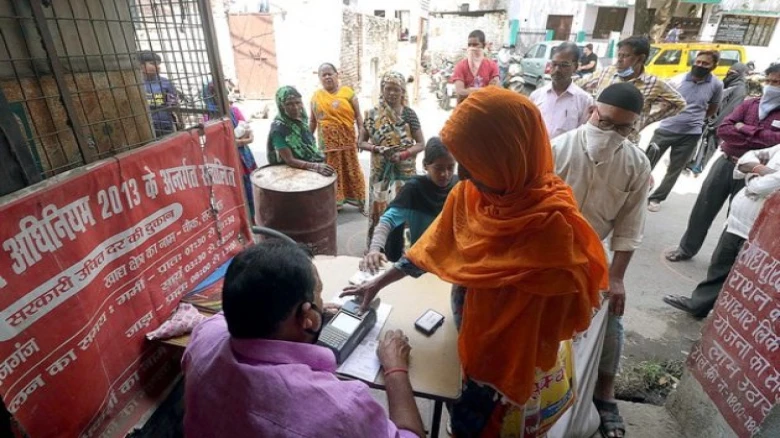Regional

According to Solicitor General Tushar Mehta, speaking for the Centre during the hearing, ONORC has not yet been introduced in states like Delhi, West Bengal, Chhattisgarh, and Assam, according to Solicitor General Mehta.
Digital Desk: The "one nation,
one ration card" (ONORC) programme, which enables migrant workers to get
rations at their places of employment in other states where their ration cards
are not registered, must be implemented, the Supreme Court ruled on Friday,
ordering states and union territories to do so.
The
top court also raised concerns with the Centre about how the benefit of free
food grain until November this year under the "Pradhan Mantri Garib Kalyan
Yojna" would reach migrant workers without ration cards. The top court
also took strong note of the delay in developing software meant to register
workers in the unorganised sector in order to create a national database.
Anjali Bharadwaj, Harsh Mander, and
Jagdeep Chhokar, activists, have filed a new application asking the Centre and
states to ensure food security, cash transfers, transportation facilities, and
other welfare measures for migrant workers on the grounds that they are in
desperate need of assistance as the crisis is worse this time around. A
vacation bench made up of justices Ashok Bhushan and M.R. Shah has also
reserved its verdict on this new application.
The bench requested written notes on
the case from the Center, the petitioner activists, and the states.
The
application was submitted in the ongoing suo motu case from 2020 about the
difficulties encountered by migrant workers as a result of restrictions imposed
by the government amid an uptick in COVID-19 instances.
According
to Solicitor General Tushar Mehta, speaking for the Centre during the hearing,
ONORC has not yet been introduced in states like Delhi, West Bengal,
Chhattisgarh, and Assam, according to Solicitor General Mehta.
The
counsel for Delhi, however, disputed the submission, stating it had been
implemented.
The bench said, "You must
implement it," when the attorney for West Bengal complained that there
were certain problems with seeding with Aadhaar numbers. This is for migrant
workers' welfare, which are eligible for rations in every state. The bench
expressed concern over how migratory workers who do not own ration cards will
be able to make use of social programmes.
"How about registering employees
in unorganised sectors?" Why should software development take so long? The
bench questioned Additional Solicitor General Aishwarya Bhati, who was also
representing the Centre, saying that you may have started it in August of last
year, and it is still ongoing.
The
bench questioned why the centre still needs a few extra months to produce the
software that can assist in compiling a nationwide database of workers.
Why
do you still need three to four months? You are not carrying out any
research... However, all you are doing is building a module to allow data to be
supplied into your process, it seems.
The
"strong" mechanism that is being created will assist authorities in
"monitoring and oversight" of the schemes.
"Why is it going to take so long?
The bench noted that you are merely developing a piece of software to build the
national database.
Senior attorney Dushyant Dave, who was
representing the activists, stated at the opening that assistance programmes
needed to be made available to everyone who lacked ration cards because the
situation was worse this year.
The Solicitor General responded by
stating that the Pradhan Mantri Garib Kalyan Yojna has been extended through
November of this year and that each member of these families will receive free
food grains totaling five kilogrammes per month. In addition, the Solicitor
General stated that other welfare programmes must be developed and implemented
by the states.
Despite statements made by government
officials, the matter has not been adequately handled, according to Colin
Gonsalves, a prominent counsel who also cited a number of prior rulings of the
highest court on the registration of migrant workers.
On
May 24, the top court had previously criticised the registration process for
unorganised employees as being "extremely slow" and had ordered the
government to set up communal kitchens and give dry rations for migrant workers
who were stranded across the nation due to the Covid-19 outbreak.
The
activists stated in their appeal that the issues and suffering experienced by
migrant workers during the lockdown in 2020 have persisted over the past year
due to the ongoing economic distress and have now become worse as a result of
new restrictions, curfews, and lockdowns being implemented in many states to
control the spread of Covid.In May last year, the top court had taken suo motu
cognizance of problems and miseries of migrant labourers and had passed a slew
of directions, including asking the states not to charge fare from migrant
workers and provide them food for free till they board trains or buses.
Leave A Comment